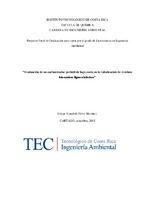Mostrar el registro sencillo del ítem
Evaluación de un carbonizador portátil de bajo costo en la valorización de residuos biomásicos lignocelulósicos
| dc.contributor.advisor | Quesada, Jaime | es |
| dc.contributor.author | Pérez-Martínez, Eileyn | |
| dc.date.accessioned | 2015-10-13T17:40:27Z | |
| dc.date.available | 2015-10-13T17:40:27Z | |
| dc.date.issued | 2015 | |
| dc.identifier.uri | https://hdl.handle.net/2238/6306 | |
| dc.description | Proyecto de Graduación (Licenciatura en Ingeniería Ambiental) Instituto Tecnológico de Costa Rica, Escuela de Química, 2015. | es |
| dc.description.abstract | Approximately 40% of residual biomass in Costa Rica is wasted. Lignocellulosic wastes are a part; though they are generated in significant quantities in Costa Rica, they often lack proper management. Their disposal in landfills involves transportation and handling costs, implies later emissions of greenhouse gases, and shortens the lifespan of the landfills. One way to valorize these wastes is carbonization. A portable, 55 gallon capacity, low cost carbonizer that is simple to operate, was designed and constructed at the Instituto Tecnológico de Costa Rica in 2012. This carbonizer is evaluated in the present work; to assess its performance, two locally common wastes were used: construction waste and waste from a pallet factory. Three carbonization essays per feedstock were made. Charcoal yield, firewood requirements, temperatures, times and processes, smoke emission, and charcoal quality were assessed. Charcoal quality was assessed by its organoleptic properties, densities, moisture, resistance to compression, volatiles, ash and heat content, germination inhibition and earthworm refusal. These tests were chosen considering the use of the charcoal as an energy vehicle and its use as a soil amendment. Yields were 32% and 29% relative to the processed feedstock mass, respectively, which is better than the expected yields according to the type of kiln. Firewood required for the process was in average 34% relative to the total mass of feedstock. The average processing time was 5 hours. Processing time and firewood requirements can be reduced by combining 2 or more reactors. Charcoal obtained had good quality fuel, according to the most analyzed properties; as a soil amendment, results of the germination test and the earthworm test refusal suggest it did not contain harmful substances. The performance of the carbonizer was very good, however, improvement options were pinpointed, regarding use of wasted heat, completion of gas combustion, maintenance of the kiln and loading of the biomass. The carbonizer showed to be a useful tool for the valorization of lignocellulosic wastes and it produces a good quality charcoal. The eventual annual cost of disposition of the wastes in a landfill was estimated in approximately US $36 thousand for the pallet waste and US $75 thousand for the construction waste. The value of the charcoal that could be produced annually from the wastes considered was estimated in approximately US 20 $450 thousand for the pallet waste and approximately US $650 thousand for the construction waste. | es |
| dc.description.sponsorship | Instituto Tecnológico de Costa Rica. Escuela de Química; Empresa Maderas Bosque Verde. | es |
| dc.language.iso | es | es |
| dc.publisher | Instituto Tecnológico de Costa Rica | es |
| dc.rights | acceso abierto | |
| dc.subject | Biomasa | es |
| dc.subject | Carbonizador | es |
| dc.subject | Relleno sanitario | es |
| dc.subject | Residuos | es |
| dc.subject | Pirólisis | es |
| dc.title | Evaluación de un carbonizador portátil de bajo costo en la valorización de residuos biomásicos lignocelulósicos | es |
| dc.type | proyecto fin de carrera | es |


